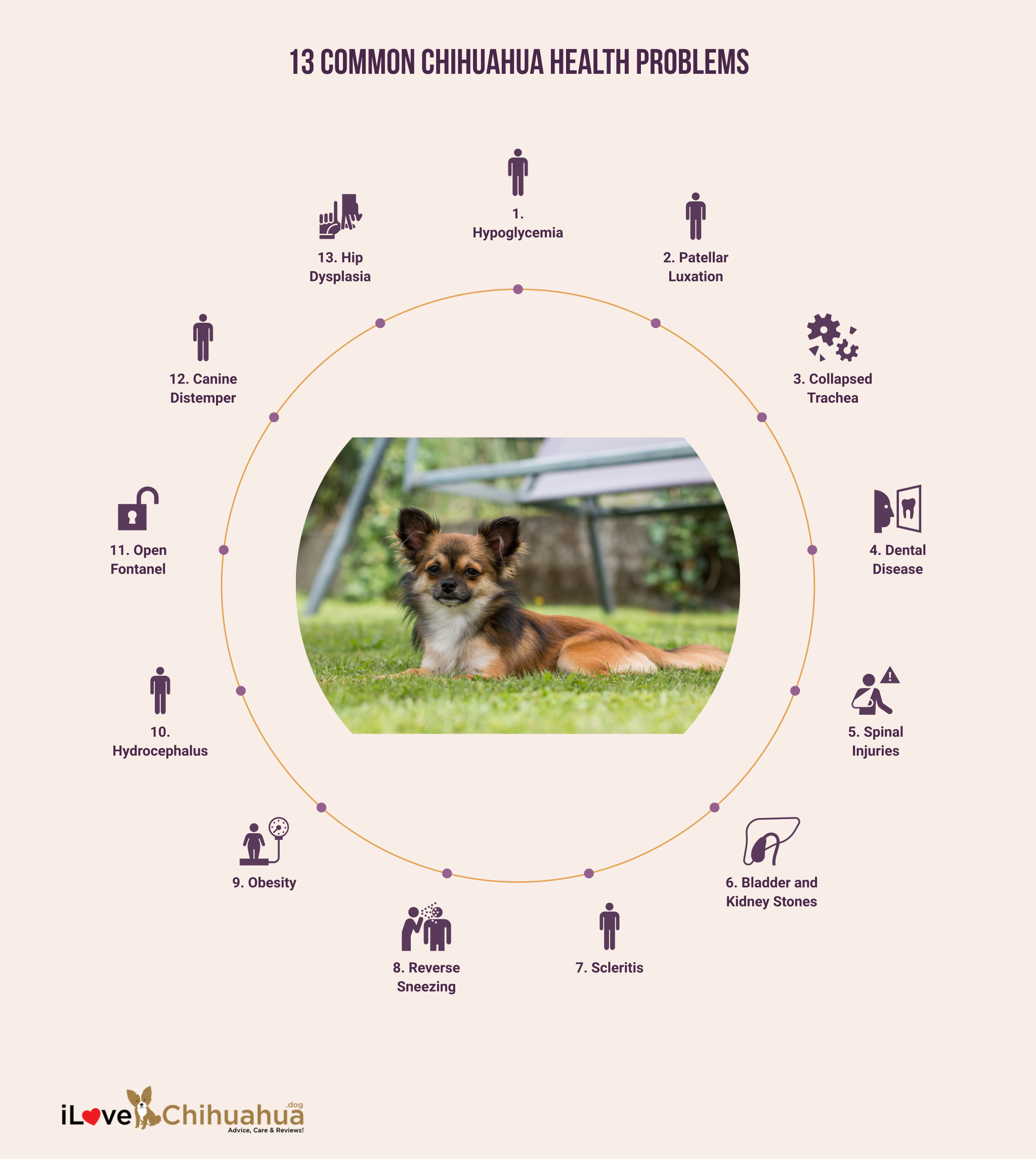Chihuahuas are one of the most popular breeds of dogs in the world, and their small stature and spunky personalities have made them a favorite companion for many people. But do Chihuahuas have health problems?
What types of medical issues should owners look out for? What special steps should be taken when caring for a chihuahua? How can pet owners ensure their chihuahua’s overall well-being?
While they may not be as prone to some illnesses as larger breeds, Chihuahuas still face many health issues that owners should be aware of to ensure their pet’s well-being. If you own a chihuahua, it’s important to understand the common health problems and how to care for your pet to keep them happy and healthy.
This article will discuss the various health issues associated with Chihuahuas and how they can be identified and treated.
13 Common Chihuahua Health Problems

Chihuahuas being one of the smallest breeds of dogs, are prone to certain health issues due to their size. Here is a list of 13 common health problems in chihuahuas:
① Hypoglycemia
Hypoglycemia, or low blood sugar, is a condition that is more common in small breeds such as Chihuahuas. It usually develops when a dog’s diet doesn’t contain enough nutrients to support its energy levels. It can lead to seizures, coma, and even death if not immediately addressed.
The most common symptoms of hypoglycemia in chihuahuas include lethargy, weakness, trembling, lack of coordination, and seizures. Other signs may include loss of consciousness and unresponsiveness.
The most effective way to prevent hypoglycemia in chihuahuas is through a proper diet and regular meals throughout the day. Chihuahuas should be fed high-quality food rich in proteins and carbohydrates to ensure their energy levels stay balanced.
Keeping their weight under control is also important, as obese dogs are at risk for developing hypoglycemia due to their inability to store adequate amounts of glycogen in the liver. Moreover, ensure your pet chihuahua has access to plenty of fresh water throughout the day, as dehydration can also cause low blood sugar due to reduced glucose absorption by the cells.
Additionally, monitor your pet’s behavior closely and look for signs of fatigue or other hypoglycemia-related symptoms. Therefore, you can detect it early on and seek medical care immediately.
② Patellar Luxation
Have you ever heard of luxating patella? It’s a common health problem in chihuahuas that can cause pain and mobility issues. The condition occurs when the kneecap (patella) moves out of its normal position, resulting in inflammation and discomfort.
The most common symptom of a luxating patella is a popping or clicking sound when the leg moves. Other signs may include limping, difficulty standing up, and pain when climbing stairs or jumping. If you notice these symptoms in your chihuahua, take them to the vet for an evaluation.
In some cases, surgery may be necessary to correct the issue. This procedure involves realigning and stabilizing the kneecap and restoring normal movement. It’s typically done under general anesthesia and can be expensive depending on your pet’s individual needs.
Fortunately, there are other ways to manage this condition without surgical intervention. For instance, physical therapy and exercise can help strengthen the muscles around the knee joint and improve its stability. Owners should also provide their chihuahuas with cushioned bedding to reduce pressure on the joint and stairs or ramps for easy access in and out of furniture.
③ Collapsed Trachea
A collapsed trachea is another health concern seen in chihuahuas. It occurs when the cartilage rings that support the windpipe collapse, resulting in breathing difficulties and other respiratory symptoms such as coughing and gagging
In order to diagnose this condition, your vet will perform tests such as a chest X-ray or CT scan to identify any abnormalities in the tracheal structure. Treatment typically includes medications to reduce inflammation and antibiotics to treat the infection if present. Sometimes, it may require surgery to repair any damage caused by the collapsed trachea.
Furthermore, you can make several lifestyle modifications to help manage your pet’s condition. Make sure they get plenty of rest and avoid strenuous exercise or activities that could exacerbate the problem. Keep their weight under control as obesity increases the risk of a collapsed trachea due to increased pressure on the airway.
Plus, maintain a smoke-free environment, abstain from walking your adult dog in windy conditions, and watch for signs of distress such as coughing or breathing difficulties so you can address it immediately if necessary.
④ Dental Disease
Tooth and gum disease is among the chihuahuas’ most common health challenges. Signs and symptoms such as bad breath, an inability to chew food, or breakdowns in their teeth can be indicative of this particular health issue. Unfortunately, it’s a preventable illness that often goes undiagnosed until the situation has become severe.
Knowing how to monitor your pet’s dental hygiene is crucial for early detection and treatment. Regular hands-on inspections, healthy diets, regular brushing, and annual trips to the vet for professional cleaning could go a long way toward maintaining optimal oral health for your pup.
Plus, cleaning up their diet habits can help reduce the risk of dental issues and retained puppy teeth, so opt for crunchy foods and kibbles to assist in plaque removal from the teeth. With regular preventive care, your chihuahua can remain healthy and happy!
⑤ Spinal Injuries
It only takes a moment for a spinal injury to occur. Because of their delicate builds, Chihuahuas can easily suffer fatal injuries from even the smallest mishaps.
Chihuahuas are particularly susceptible to spinal injuries and disorders by blunt force. When the spinal disc shifts or slips out of position, a condition known as intervertebral disc disease (IVDD) can develop (this disease is oftentimes genetic and not the result of trauma).
Fortunately, physical treatment and doggy wheelchairs can alleviate discomfort and restore mobility after an accident. Surgery may be required in more serious cases. To minimize the risk of spinal injuries, owners should provide their chihuahuas with gently sloping ramps to navigate different surfaces and avoid lifting them by their tail or hindquarters.
⑥ Bladder and Kidney Stones
Bladder and kidney stones are another health issue that Chihuahuas may be at risk of. These small, hard deposits form within their urinary tract and can cause pain, discomfort, and even blockages.
In order to properly diagnose these issues in your pup, your vet will usually recommend X-rays or an ultrasound. Treatment includes dietary changes, medications, and surgery if the stones are too large to be broken up naturally.
Weight management is one of the most important factors in avoiding bladder and kidney stones, as obesity can lead to increased calcium oxalate crystals in their urine. Provide them with plenty of fresh water throughout the day.
Consider switching to a high-quality, low-calorie, and protein diet to ensure your pup gets the nutrition without unnecessary byproducts. Exercise can also help keep them healthy, so remember to take them out for regular walks and playtime!
⑦ Scleritis
Scleritis is an inflammatory condition affecting the sclera or the eye’s outer layer in chihuahuas. The most common symptom is pain and inflammation around the eyes, as well as redness and swelling. It can also cause temporary vision loss.
If your chihuahua displays any signs of this condition, it’s important to seek veterinary help immediately. Treatment typically includes topical steroids, anti-inflammatory medications, and supportive care to reduce discomfort. Your vet may also recommend a scan to rule out any complications or underlying conditions causing the scleritis.
Taking prompt action can help ensure that your pet recovers quickly and requires minimal treatment.
⑧ Reverse Sneezing
Reverse sneezing is not dangerous, but it can be a bit frightening for owners. This condition can occur when your chihuahua takes in a large amount of air through the nose, causing them to make snorting or honking noises as they try to expel the air. Reverse sneezing is typically caused by allergies, environmental irritants, and even excitement.
If you notice your chihuahua reverse sneezing, try to remain calm, as it will only worsen their anxiety. It’s recommended that you gently stroke their throat in a downward motion until the episode passes. If this doesn’t help, contact your vet for further advice.
⑨ Obesity
According to the American Kennel Club’s dog breed standards, Chihuahuas should not exceed 6 pounds. Unfortunately, obesity is a serious concern for this breed and can lead to more health issues down the line, such as diabetes, heart disease, joint problems, and even cancer.
The common signs and symptoms of obesity in chihuahua dogs include decreased energy levels and activity, excess belly fat or “potbelly” body shape, difficulty breathing, reluctance to move or to lag during walks, and visible folds of skin over the eyes, elbows, hips and back.
Addressing obesity requires consistent monitoring by a veterinarian and lifestyle changes incorporated by owners, such as increased exercise, limited treats, and food modification with decreased calorie intake.
Additionally, you should pay additional attention to the nutritional quality of the diet to ensure all basic vitamins and minerals are consumed while keeping caloric intake low. Through close monitoring of calorie intake and increased amounts of physical activity then, it’s possible to help chihuahuas reach an ideal healthy weight.
⑩ Hydrocephalus
Have you noticed your chihuahua puppy has a large head and strange behavior? If you answered yes, they could be suffering from hydrocephalus. This is a neurological disorder in which cerebrospinal fluid accumulates within the brain, causing an increase in the size of the head and potential long-term consequences such as seizures and mental impairment.
It’s essential to take them to a veterinarian for imaging tests such as CT scans or MRIs. These tests will give the vet an accurate picture of the condition and determine the best course of action. Treatment options vary depending on the severity of the condition but may include medications such as diuretics or anticonvulsants.
Surgery is another option for severe cases. It may involve draining excess fluid from the brain or inserting a shunt system that helps regulate cerebrospinal fluid within the body.
When it comes to long-term care for hydrocephalus in chihuahuas, owners should strive to keep their pet’s environment stress-free and provide plenty of love and attention. Physical activity should be limited until symptoms subside and monitored closely after that, as exercise can exacerbate hydrocephalus-related issues such as seizures.
⑪ Open Fontanel
Chihuahua owners also need to be mindful of a condition known as open fontanel, which can cause breathing problems. Dogs with this ailment have soft areas on their skulls because their skulls didn’t fully close during development. Even though they may need to be a little less hyperactive than they’d prefer, many dogs diagnosed with this illness have regular lives.
Since even a minor incident can trigger life-threatening head damage, it’s best if these puppies have a peaceful existence. Talk to your vet about the diagnosis and strategies to ensure your tiny pet stays healthy for years to come, as dogs with this illness can also develop hydrocephalus.
⑫ Canine Distemper
Canine distemper is a virus affecting dogs’ respiratory, gastrointestinal, and nervous systems. It’s typically seen in puppies between three months and five months old but can affect any breed. The symptoms of canine distemper include fever, discharge from the eyes and nose, vomiting, diarrhea, coughing, seizures, and paralysis.
If your chihuahua shows any signs of this disease, it’s important to take them to the vet immediately for a proper diagnosis. Vaccination against canine distemper is the most effective way to prevent your pet from catching this virus.
However, puppies who have not been vaccinated are at higher risk for developing canine distemper. Treatment for this condition depends on its severity and may involve supportive care, antibiotics, and antiviral drugs.
⑬ Hip Dysplasia
HIP Dysplasia in chihuahuas is a condition characterized by abnormal hip joint development that leads to pain and lameness. It occurs when the femoral head and its associated ball-and-socket structure fail to form correctly or do not fit together properly.
This misalignment can cause instability, inflammation, and eventually arthritis as the cartilage covering the hip joint deteriorates over time. If left untreated, hip dysplasia can be disabling or even life-threatening if severe cases arise.
Early diagnosis is key in treating this condition. Therefore, pet owners need to watch out for signs such as weakness in the rear legs and hip joint swelling while lying down, resulting in difficulty climbing stairs or getting up after rest. It’s also important for breeders to identify dogs at risk of this condition through careful x-ray analysis and genetic testing.
How to Keep Your Chihuahua Healthy

Chihuahuas are lovable little dogs that can bring joy to your life. But just like any other pet, they need routine care and attention to ensure their overall health. Here are some tips for keeping your chihuahua healthy and happy.
🦮 Diet
A balanced diet is essential for any pet’s health, and chihuahuas are no exception. Feeding them a combination of high-quality wet and dry food will give them the nutrients needed for growth and development. Avoid giving them table scraps as this may cause digestive upset or nutritional deficiencies.
🦮 Exercise
Like all other pets, chihuahuas need regular exercise for both physical and mental stimulation. Regular walks in the park or playing fetch in the backyard are good activities that can help keep your pet active and promote muscle tone.
🦮 Grooming
Chihuahuas have long coats that require regular brushing to keep them looking their best. Regular brushing also helps remove dirt and debris from their coat that could cause skin irritation if left untreated. It’s also important to regularly check their ears, eyes, teeth, and paws for any signs of infection or problems.
🦮 Veterinary Visits
Regular vet visits are essential to ensure that your pet receives necessary vaccinations, heartworm prevention, and general checkups to detect any underlying medical conditions early on. Make sure you follow up with any recommended treatments after each visit, as this will help your chihuahua stay healthy in the long run.
Frequently Asked Questions
Q: What is a teacup chihuahua?
A: A teacup chihuahua is a miniature variety of the breed that weighs less than six pounds when fully grown. These dogs are popular due to their size, but they require special care and attention due to their delicate nature.
Q: Does a chihuahua mix need the same care as a purebred chihuahua?
A: Yes. Regardless of their breed mix, all chihuahuas require the same care and attention. This includes regular veterinary visits, a balanced diet, exercise, and proper grooming. It’s important to note that some mixed breeds may be at higher risk for certain health problems than purebreds. Therefore it’s best to speak with your veterinarian about any specific needs or concerns regarding your pet’s health and well-being.
Q: How can a Chihuahua Club help my pet?
A: A Chihuahua Club is one of the best resources for anyone looking to learn more about the breed. Most clubs offer educational seminars, health screenings, and other activities that benefit both owners and their pets. In addition, most clubs also provide information on local rescue groups or rehoming options in case you cannot keep your pet. Joining a club is a great way to stay informed and connected with other chihuahua enthusiasts.
Q: Which chihuahua health issues should I be aware of?
A: Common health issues seen in chihuahuas include dental problems, obesity, joint disorders such as hip dysplasia, and eye problems such as cataracts. It’s important to keep an eye out for any signs or symptoms of these conditions and to bring your pet in for regular check-ups with the vet so that you can address any health concerns quickly. Early diagnosis and treatment are key to helping your pet live a long and healthy life.
Q: Can a small size chihuahua have a long life?
A: Yes. Chihuahuas can live long and healthy lives if they receive the proper care and nutrition. While a small dog may be at greater risk for certain health issues due to their fragile nature, you can minimize these risks with proper nutrition, exercise, and regular vet visits.
Q: Why does my chihuahua’s heart murmur?
A: Heart murmurs in chihuahuas can be caused by various factors, including heart valve disease, infections, or congenital defects. Therefore, you must bring your pet in for an evaluation with the vet if you notice any abnormal heart sounds.
Final Words
Chihuahuas have a wide variety of health problems that you can manage with proper diagnosis and appropriate treatment. While some conditions are treatable, others may require lifelong management. Owners need to be aware of the potential health risks associated with these tiny dogs and take steps to ensure they remain healthy. This includes providing them with an appropriate diet, plenty of exercise, and regular visits to the vet for checkups. By taking proactive measures, owners can ensure their beloved chihuahua is happy and healthy for years to come!
Here at ILoveChihuahua, we share our personal experiences as owners of this feisty breed. We talk about recommended methods, dog supplies picks, and advice on common Chihuahua problems. Our goal is to promote responsible dog ownership, so there would be fewer Chihuahuas in shelters.


